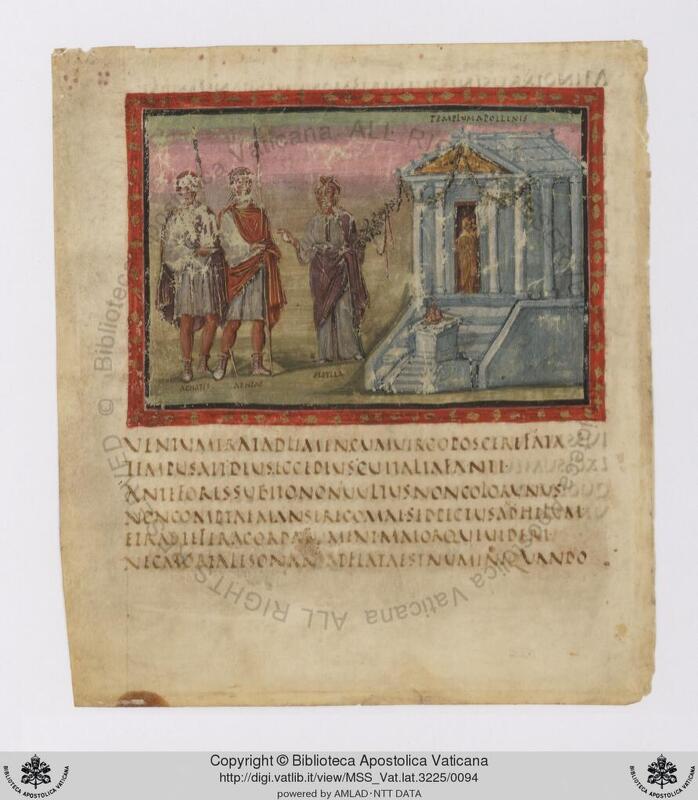Vergil, The Aeneid
Introduction:
Vergil, whose formal Latin name was Publius Vergilius Maro, lived from ca. 70 to 19 BCE and is considered one of ancient Rome's most significant poetic authors. He composed the Aeneid during the time of the first emperor of Rome, Augustus, and the poem tells the epic story of Rome's founding by Aeneas, a refugee from the Trojan War. In this passage from Book VI, lines 33–76, Aeneas and his companion, Achates, have finally arrived on the Italian peninsula after overcoming many challenges. They visit the Temple of Apollo in Cumae, near Naples, where Aeneas seeks the guidance of a sibyl (priestess/prophetess) named Deiphobe. In the Vatican Vergil manuscript (Vatican City, Bibliotheca Apostolica Vaticana, MS Vat. lat. 3225, the text on fol. 45v is lines 45–50 (boldfaced below), but the picture illustrates lines on the preceding fol. 45r. Pages in the manuscript have been lost over time, and the current fol. 46r continues with Book VI, line 219.
Translation: Some passages have been simplified and words added in brackets to aid comprehension.
Translation: Some passages have been simplified and words added in brackets to aid comprehension.
. . . they would have carefully studied it all with their eyes, had not Achates, who was already sent ahead, called out to them with a priestess of Phoebus and Trivia, Deiphobe, the daughter of Glaucus. She spoke to the king: "There is no time for those spectacles. It would be better to sacrifice seven immaculate bulls, and, as is the custom, seven healthy ewes." Having spoken to Aeneas—the men did not delay in following her sacred commands—the priestess summoned the Trojans into her mountain shrine.
A great flank was carved into the grotto of the Euboean cave: a hundred wide entrances, a hundred mouths, led there, a hundred sounds also rushed down from it: the counsels of the sibyl. They came to the threshold as the virgin spoke, "It is time to ask the fates. A god! Behold! A god!" While she was speaking before the gates, her complexion suddenly changed color and the locks of her hair streamed in disarray. She panted as her heart swelled up in a savage fury. She seemed to grow larger, roaring as if immortal. She was inspired by the divine power of a god approaching her. "Do you falter in your prayers and offerings, Aeneas of Troy? Do you delay? They will not open for you yet, the mighty gates of this awesome house." Having spoken these words she fell silent. An icy shiver rushed through the Trojans' hard bones. Their king then poured forth a prayer from the depth of his heart: "O Phoebus, who always pitied the grave suffering of Troy, . . . With you as my guide, I crossed seas beyond number, bordering wide lands, utterly remote . . . at last we grasp upon the very shores of elusive Italy. May the fortunes of Troy pursue us only this far! It is divine will that you take pity upon the Pergamene nation [i.e., us] at last, all you gods and goddesses . . . And you, most sacred prophetess who knows what is to come, grant—I beg only for the kingdom promised to me by the Fates—that the we may settle in Latium with the gods and shaken powers of wandering Troy. . . . A great sanctuary in our kingdom awaits you as well; for I myself will place in it your prophecies and the arcane divinations you have spoken to my people. I will also consecrate for you a chosen priesthood, kind lady. But do not now commit your revelations to leaves only, lest they mockingly flutter away upon swirling winds; I beg that you sing your secrets aloud." He now ended his speech.
